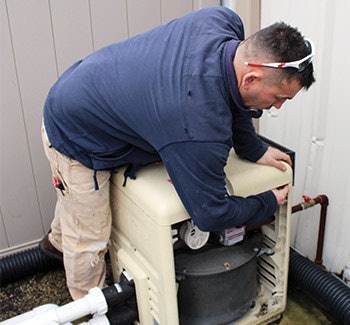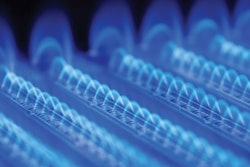
 The original efficiency rating of any pool heater can change over time; a consistent maintenance record helps keep performance from diminishing. Here, troubleshooting is provided by a technician from All Seasons Pools and Spas in Orland Park, Ill.All Seasons Pools and Spas
The original efficiency rating of any pool heater can change over time; a consistent maintenance record helps keep performance from diminishing. Here, troubleshooting is provided by a technician from All Seasons Pools and Spas in Orland Park, Ill.All Seasons Pools and Spas
Alongside the surge in demand for new pools this year has been an even larger movement to maximize the utility of existing pools. Most Americans are still mainly at home, often in quarters that seem much smaller than they used to, and the backyard pool has found a new and essential role in the lives of people fortunate enough to own one. While the end of the pandemic will alleviate this reliance on the backyard as refuge to some extent, the lesson learned from COVID — the home is the only space you can count on so make sure it's comfortable — will not be lost any time soon. And a heater is the only way to make the pool comfortable in the cooler/colder months.
At the same time, as any service tech can attest, many homeowners that already appreciate pool heat are using older, inefficient units that run up exorbitant bills to keep the water warm.
For these reasons, now is a good time to bring up the subject of adding or upgrading pool heaters. It will allow your customers to begin the pool season much earlier this year and lower the utility bills for the ones currently hanging on to wasteful, obsolete heaters. As a happy coincidence, it will also provide you a new revenue stream as the early spring approaches.
However, before you embark on a "heater sales program" initiative, be sure you can explain how a heater works, and when suggesting a heater upgrade, why an old heater becomes less efficient over time. Command of these concepts and terms is essential. Just as important is the emotional side: Your customers know they'll want to get in the water as early as possible this spring, and you're there to help them do it, while making sure it doesn't cost them a fortune.
Understanding New High-Efficiency Pool Heaters
Pool professionals sometimes forget the importance of simply explaining how pool heaters work. And even a basic description of the water heater mechanism will lead to an explanation of the benefits of upgrading to a high-pooefficiency pool heater.
RELATED: Pool Heater Installation 101
Begin by describing how the heater fits into the pool's circulation system. As the water passes through, the heater's combustion chamber ignites the gas, heating the copper tube arranged above the burner tray. The heat from these copper tubes is conducted to the water, increasing the water temperature. The water then returns to the pool and re-circulates for consistent heating. This simple process provides quick, controlled heating of the pool water.
Once they understand how the unit works, they will need to understand why a higher efficiency rating translates to heating their pool water for the lowest possible cost.
Explaining Heater Efficiency and BTU Output
Pool heaters are "rated" by BTU input and output (BTU stands for British Thermal Unit). Inputs and outputs range from 75,000 BTU to 4,500,000 BTU.
Newer pool heaters start off being 82 to 96% efficient — this means if the heater is rated 84% efficient with a 400,000 BTU input, the actual heating capability is 84% of the total BTUs — so in this case, it would be 336,000 BTUs. By comparison, using this same example, a 400,000 BTU heater that is seven to 10 years old, which was initially 78% efficient, only provided 312,000 BTUs of output when it was new and now provides even less due to degradation over time.
An important point to make with your clients is that the original efficiency rating of the heater does NOT remain the same throughout its operating life. Unfortunately, most heaters lose efficiency over time due to lack of service. If the client is looking to have warmer water and spend less money to get it, they will need to get a newer, higher-efficiency heater.
One of the easiest ways to explain heater efficiency is to tell the pool owner: If your heater is 82% efficient, for every $1.00 you spend on gas, $0.82 of that dollar goes into heating the pool water and the remaining $0.18 goes up the chimney and into the atmosphere.
RELATED: Pool Heater Best Practices
Using an online cost calculator is an excellent way to provide a much more accurate calculation of how much a customer can save with a new pool heater. Some manufacturers provide an online cost calculator that allows you to input the size of the pool to determine the total gallons of water being heated as well as the temperature of the water the customer wants in the pool. Pool professionals can use the online calculator to determine the cost of heating the pool water and then compare that figure to what the customer is currently paying to heat that same amount of water. In many cases, pool professionals find that the customer will reduce their energy bills by 30% by upgrading to a newer, energy-efficient heater.
Explaining How Heaters Become Less Efficient
If the consumer is curious, they might also want to understand why a heater becomes less efficient. This information is important because it also points to the importance of regular heater maintenance to avoid prematurely reducing the efficiency of the unit. There are several factors that reduce the efficiency of a heater, all of which are a part of regular operation. The most important of these are:
Build up on the heat exchanger tubes: Heat exchanger tubes build up chemical residue and calcium that causes the unit to lower its ability to transfer heat. When this happens, the heater requires more energy to heat the same amount of water and becomes less efficient. Ensuring proper water chemistry balance with a regular maintenance program is the best way to ensure against this problem.
Low gas pressure: Insufficient gas pressure in the line can lead to build up on the internal parts of the heater that leads to blocking of the heat exchanger. Always check gas pressure lines and be sure installed heaters are getting the correct gas pressure per the product manuals. Remember that once you upgrade your client to a new heater, always make sure the gas supply can accommodate that unit. This is a common point of emphasis when going from a 200,000 to a 400,000 BTU unit, for example.
Lack of ventilation and combustion air on heaters installed indoors: A lack of ventilation and combustion air can also cause 'soot' which acts as an insulating layer on the exchanger and prevents the heat from transferring to the water efficiently. Always follow the manufacturer's requirements for proper combustion and ventilation air.
Proper water flow: Water moving too fast through the heater will cause condensation and possible erosion. If it is moving too slow, the heater is not able to warm the water efficiently, and as a result, it may cause the unit to cycle on and off — ultimately damaging the heat exchanger. In this case, service technicians should check the water flow into the heater as an essential part of set up and regular maintenance.
RELATED: How to Size a Pool Heater
We know that the pandemic has increased pool usage, and therefore, pool heaters are also being utilized more heavily. Therefore it is important to stress to pool owners the importance of regular maintenance on their pool heater to avoid reducing heater efficiency that will result in higher utility bills to warm the pool water as desired. Upgrading to a more energy-efficient unit will help control the customer's operating costs despite heating water over an extended season.
Providing Benefits of Upgrading to a New Heater
If you have a customer with an existing pool water heater, they are going to want to know why they should upgrade to a new heater. There are basically five simple reasons:
1. Newer heaters are much more efficient and use less energy to heat the pool water, as today's heaters are mostly 82 to 96% efficient while older models are typically 70 to 80%.
2. As heaters age, wear and tear of the parts cause them to operate below their original efficiency rating and lack of maintenance will also contribute to this.
3. Some newer pool heaters are smaller, take up less space and have lower emissions than older models — making them better for the environment.
4. In today's market, there are a variety of choices for high-efficiency heaters to choose from. Find one that best suits your application in terms of BTUs and physical size.
5. Newer heaters are safer because they have sealed combustion, making them less of a fire hazard, but the manufacturer's requirements for proper installation should always be followed.
Taking the time to explain all of these advantages to the pool owner will smooth the path to a sale. Remember, your clients want the benefits a new heater can provide. Your job is to show them why the investment makes sense. They will appreciate your suggestion of a way to help them get the most utility and enjoyment out of their pool, while helping control their operating costs.
It won't hurt your bottom line, either.
Luciano Tortorella is a product specialist for Heat Pumps/Gas Heaters/Hi-E Heaters at Pentair Water Pool & Spa.
This article first appeared in the January 2021 issue of AQUA Magazine — the top resource for retailers, builders and service pros in the pool and spa industry. Subscriptions to the print magazine are free to all industry professionals. Click here to subscribe.











































